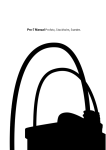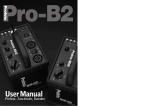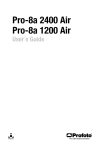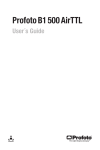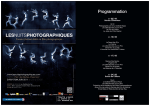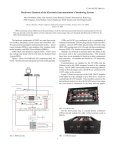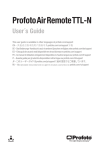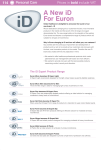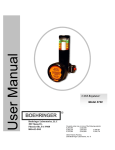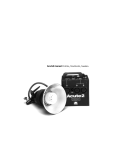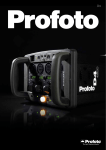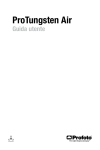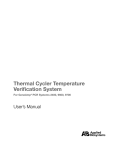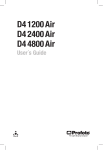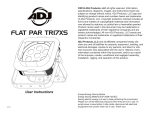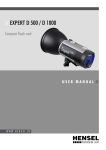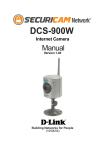Download ONSDAG_PF_D4_manual GP/b
Transcript
User Manual Profoto–Stockholm, Sweden Profoto x1 The Light Shaping Company D4 Profoto D4 – Top Panel Profoto D4 – Top Panel d a b c i i j j l m d e f g h i i j j l l l m m m k n r o See page 17 for descriptions! p q s t å D4 Profoto D4 – Warning D4 Safety Instructions Profoto generators and flash heads are part of a complete professional lighting system. Please read the instruction manual carefully before use. Flash tubes and modelling lights emit considerable heat and can be dangerous if not used properly. Always unplug the lamp cable from the generator before changing the modelling light, glass cover or flash tube. Under no circumstances are generators or heads to be opened! There is dangerous high voltage inside the generator! Service is only to be carried . .. .. .. .. out by authorized personnel. Never connect accessories of other brands without consulting an authorized service station. Do not touch hot glass or metal parts. Do not obstruct ventilation. Do not connect the lamp head with the transport cap in place. Never place filters or diffusing material directly onto glass covers, flash tubes or modelling lights. Never position the light extremely close to people. When mounting umbrellas, do not touch flash tubes or modelling lights with the metal shaft – risk of high voltage. Always use a grounded power supply/mains outlet. Protect the flash equipment against moisture, condensation, heat, sand and dirt. The Light Shaping Company 1 Profoto Profoto D4 – Content D4 User Manual Introduction .................................................................................................................................... 5 Acute/D4 Heads ...................................................................................................................... 6-10 Other Profoto Heads .................................................................................................................... 12 D4 Generators ........................................................................................................................ 13-33 System Chart .......................................................................................................................... 14-15 Technical Data ............................................................................................................................ 33 Digital Wireless Freedom (Radio Slave) .................................................................................... 34 Profoto Studio Software .................................................................................................... 35-40 The D4 system consists of the following products: Generators D4 1200 D4 2400 D4R 1200 (with radio slave receiver) D4R 2400 (with radio slave receiver) Heads Acute/D4 head The photographer’s tools are a natural part of the creative process. Like the painter’s brush, the sculptor’s chisel, or the musician’s instrument, their form and design should reflect their function. They should have the right feel, and be aesthetically pleasing. Acute/D4 twin Acute/D4 ring NEW ProHead series Profoto Studio Software (1 CD) All actual Profoto light shaping tools and accessories. – Profoto founders Conny Dufgran and Eckhard Heine The Light Shaping Company 3 Profoto Profoto D4 – Welcome D4 Profoto welcomes you to the D4 system, and thanks you for the confidence in our products! With the D4 line of generators, Profoto offers a sophisticated tool of exceptional precision and versatility with a quantity of innovative, yet easy to use, functions that are the result of decades of collaboration with demanding photographers world-wide. The unique ergonomic design combines the positive feel of mechanical knobs and switches with the precision of digital technologies. Profoto’s special “Hybrid Flash Technology” uses advanced digital voltage stabilisation and individual capacitor banks to provide extremely stable flash power and colour temperature – from flash to flash and over the whole range, even when several flash heads are used. This makes the D4 generators the first choice for critical analogue and digital shoots, always guaranteeing exact and repeatable results. Four asymmetric and individual adjustable lamp connections offer the same flexibility as several independent generators. In addition, our new “Profoto Studio” software makes remote adjustments via computer very simple, even when many generators are used in combination. We check that all Profoto equipment passes the quality and capability levels the most demanding photographers require. For this reason our flash equipment is the standard in leading rental studios in New York, Tokyo, Cape Town, Paris etc. and the most rented flash the world over. Create your own light The most important thing in photography is the light, and it is essential that the flash system offers complete freedom to create your own style. The Acute/D4 heads give you this possibility: The light sources, the flash tube and the modelling light, are placed together inside the glass cover. What you see with the modelling light will be what you get when the flash fires. This makes it easier for you to adjust the light creatively. The reflectors are adjustable and lock easily into place. Most reflectors can be moved forward or backward in relation to the optical center of the light source, effectively narrowing or widening the spread of light and changing the intensity and fall-off charakteristics as well. The Acute/D4 head and the Acute/D4 twin are supplied with a frosted and UV-coated glass cover, which together with the flash tube, produce a colour temperature perfectly suited to daylight film. In addition there are glass covers with adjusted filtration available, that anable the colour temperature to be changed. The whole D4 system is modular. Every single reflector and accessory creates its special light and the unique Profoto focusing system offers you a possibility to create your own light with only a few different light shaping tools. The Light Shaping Company 5 Profoto D4 Profoto D4 – Acute/D4 Heads Profoto D4 – Acute/D4 Heads Acute/D4 Head D4 Acute/D4 Twin 1. UV-reduced flash tube 1. UV-reduced flash tubes 2. Umbrella holder 2. Umbrella holder 3. Manoeuvering system with locking lever 3. Manoeuvering system with locking lever 4. Stand adapter 16mm (5/8") 4. Stand adapter 16mm (5/8") 5. Glass Cover, frosted, UV-coated 5. Long Glass Cover, frosted, UV-coated 6. Halogen modelling lamp, 250W, Mini-Can E11 socket (500W optional) 6. Halogen modelling lamp, 500W, Mini-Can E11 socket 7. Locking springs 7. Locking springs 8. Standard Zoom Reflector 8. Magnum Reflector 9. Modelling light On/Off switch 9. Modelling light On/Off switch 1 1 5 6 6 5 1 7 7 9 9 3 3 2 2 4 4 8 Profoto 8 6 The Light Shaping Company The Light Shaping Company 7 Profoto D4 Profoto D4 – Acute/D4 Heads Profoto D4 – Acute/D4 Heads Acute/D4 Head Acute/D4 Twin All Profoto lamp heads are designed for maximum light shaping ability.The reflectors lock easily into place and by sliding the reflector different types of light shapes are achieved. All Profoto reflectors and accessories fit the Acute/D4 Heads. The flash head has a built in holder for the umbrella. A UV-reduced quartz flash tube is included with all Acute/D4 Heads. The flash tube has two metal pins. When removing a flash tube, pull it straight out of the sockets. When inserting a new flash tube, check that the trigger wire clasps properly around the flash tube (please see mounting instructions in package). Always use original Acute/D4 flash tubes, other flash tubes can create serious malfunctions. In case the head overheats the modelling light automatically switches off. When the temperature has dropped sufficiently the modelling light will switch on again.The Acute/D4 Head is fan cooled and it has an automatic voltage selector for the fan. The Acute/D4 Twin offers even shorter flash duration,very quick recycling or the ability to obtain 4800 Ws out of one single head. An Acute/D4 Twin has two flash tubes. As the flash duration is shorter at low power settings, and as only half of the desired power is used in each tube, consequently shorter flash duration is obtained. If you require shorter flash duration and for example need 1200 Ws, you connect the Acute/D4 Twin to the A and B sockets on the D4 1200 generator and fire 600 Ws from each tube. The flash duration is shorter than if a standard Acute/D4 Head is used.The flash duration at 1200 Ws with an Acute/D4 Head is 1/1000 sec. while it is only 1/1600 sec. with an Acute/D4 Twin. If, on the contrary, you require faster recycling, you power one Acute/D4 Twin with two D4 generators. The recycling is faster since each generator needs to recharge less of it’s energy.To get 4800 Ws from one head you connect the Acute/D4 Twin to two D4 2400 generators. WARNING! The proportional modelling light is powered directly from the mains and it is therefore important to check that the rated voltage for the lamp corresponds with the mains supply before connecting a head with the generator. A switch at the back of the head allows turning off the modelling light. WARNING! The proportional modelling light is powered directly from the mains and it is therefore important to check that the rated voltage for the lamp corresponds with the mains supply before connecting a head with the generator. A switch at the back of the head allows turning off the modelling light. PLEASE NOTE! Always unplug the lamp cable from the generator before changing modelling lamp, glass cover or flash tube. A 250W E11 Mini-Can halogen lamp is included, but the head is also available with a 500W lamp. PLEASE NOTE! Always unplug the lamp cable from the generator before changing modelling lamp, glass cover or flash tube.The modelling light is a 500W Halogen with a Mini-Can socket (E11). The flash tube has two metal pins. When removing a flash tube, pull it straight out of the sockets. When inserting a new flash tube, check that the trigger wire clasps properly around the flash tube (please see mounting instructions in package). Always use original Acute/D4 Twin flash tubes, other flash tubes can create serious malfunctions. The Acute/D4 Head is supplied with a frosted UV-coated glass cover and a Standard Zoom reflector. Combined with the UV-reducing quartz flash tube the frosted glass cover offers the recommended colour temperature for daylight type film. Distinctive colour temperature adjustments can be obtained by combining glass covers with different coatings. The Acute/D4 Twin is supplied with a frosted UV-coated glass cover and a Magnum reflector. Combined with the UV-reducing quartz flash tube the frosted glass cover offers the recommended colour temperature for daylight type film. Distinctive colour temperature adjustments can be obtained by combining glass covers with different coatings. The following glass covers are available: For 250W modelling lamp 10 15 33 Glass Cover, frosted, UV-coated (standard) 10 15 34 Glass Cover, frosted, uncoated (+300°K) 10 15 35 Glass Cover, frosted, extra UV-coated (-300°K) 10 15 36 Glass Cover, clear, uncoated (-300°K) 10 15 37 Glass Cover, clear, UV-coated 10 20 02 250W, 120V Halogen, Mini-Can 10 20 13 250W, 240V Halogen, Mini-Can The following glass covers are available: 10 15 18 10 15 19 10 15 20 10 15 21 10 15 23 10 20 07 10 20 15 For 500W modelling lamp (long version) 10 15 18 Glass Cover, frosted, UV-coated (standard) 10 15 19 Glass Cover, frosted, extra UV-coated (-300°K) 10 15 20 Glass Cover, frosted, uncoated (+300°K) 10 15 21 Glass Cover, clear, UV-coated 10 15 23 Glass Cover, clear, uncoated (+300°K) 10 20 07 500W, 120V Halogen, Mini-Can 10 20 15 500W, 240V Halogen, Min-Can Profoto 8 D4 The Light Shaping Company Glass Cover, frosted, UV-coated (standard) Glass Cover, frosted, extra UV-coated (-300°K) Glass Cover, frosted, uncoated (+300°K) Glass Cover, clear, UV-coated Glass Cover, clear, uncoated (+300°K) 500W, 120V Halogen, Mini-Can 500W, 240V Halogen, Min-Can The Light Shaping Company 9 Profoto D4 Profoto D4 – Acute/D4 Heads Profoto D4 – Welcome! D4 Acute/D4 Ring The Acute/D4 Ring is an entirely mobile source of light. The internal diameter of 100mm provides plenty of space for most professional camera lenses. Since the camera holder can be moved forwards and backwards, as well as upwards and downwards, most cameras can be attached. The Acute/D4 Ring gives a direct light without any shadow on the foreground, this makes an excellent light source for confined areas, such as the interior of technical installations. Many fashion photographers also use the Acute/D4 Ring to find new angles and capture details. The ring flash provides a very distinct, directed light, but can be complemented by the Softlight reflector, which increases the light source, thereby producing a softer light with little shadows. The optional Widesoft delivers even softer illumination. For close-ups, there is a reflector that focuses the light to 50cm in front of the camera lens.The maximum charge is 9600Ws/ minute.This means 4 flashes a minute at 2400Ws, 8 flashes at 1200 Ws,16 flashes at 600 Ws, etc. Changing the flash tube is only to be done by a professional service station. .. .. . Mounting the reflector: Remove the two ridged screws fixating the camera holder. Remove the four ridged nuts holding the outer and inner reflectors together. Run the lamp cable through the outer reflector and let the reflector slide into position. Reassemble the outer and inner reflectors using the ridged nuts. Reassemble the camera holder using the two ridged screws. Accessories: 10 06 42 10 06 43 10 07 17 Profoto PR Softlight Reflector PR Close-up Reflector PR Widesoft Reflector 10 The Light Shaping Company The Light Shaping Company 11 Profoto D4 Profoto D4 – Other Heads Profoto D4 – Generators Other Flash Heads The D4 generators are fully compatible with the line of Acute2, Acute/D4 Heads and the new ProHead. When equipped with a 220-240V/50Hz modelling lamp, PF heads, PB, Pro-6 and Pro-7 heads (except Pro-7b head) can be used at 220-240/50Hz . Profoto does NOT recommend the use of these heads with D4 generators at 90-130V, because the fan will not work properly, leading to problems with overheating. We don't recommend the use of old Acute PAB heads with D4 generators because the missing fan may lead to problems with overheating. We also don’t recommend the use of the discontinued Acute Alfa heads (AB or ABS heads) – at some settings of the D4 generator the fan of these heads doesn’t work properly. D4 Generators System Chart .......................................................................................................................... 14-15 Nomenclature .............................................................................................................................. 17 Quick Guide .................................................................................................................................. 18 Mains Connection ........................................................................................................................ 19 Connecting Lamp Heads ...................................................................................................... 19-20 Energy Control and Distribution .......................................................................................... 23-24 Modelling Light WARNING! Please make sure to configure your D4 to be compatible with Acute/D4 Head or ProHead before you connect a Profoto head with a D4 generator. Se instructions on page 19-20. Heads used on a D4 generator have to be equipped with a modelling lamp corresponding to the actual mains voltage. But any PF, former Pro-6, Pro-7 head or new ProHead used on a Pro-3, Pro-5, Pro-6, ProPack or Pro-7 generator, must be equipped with a 120V modelling lamp irrespective of the mains voltage. D4 .................................................................................................................... Connecting Camera & Flash Meter 24-25 .......................................................................................... 25 Recharging .................................................................................................................................. 25 Ready/Charging Signals ...................................................................................................... 25-26 Photo/IR-Cell .............................................................................................................................. 26 Auxiliary Functions .............................................................................................................. 26-29 Memory Function ................................................................................................................ Automatic Safety Functions 28-29 .................................................................................................... 30 Computer Connection .................................................................................................... 30, 35-40 Additional Information Colour Temperature .................................................................................................................... 31 f-stop Stability ............................................................................................................................ 31 Flash Duration ............................................................................................................................ 31 ........................................................................................................ 31 .................................................................................................................................... 32 Petrol-Electric Generators Warranty Technical Data Profoto 12 The Light Shaping Company The Light Shaping Company ...................................................................................... 13 .................. 33 Profoto MONOLIGHTS AND GENERATORS Profoto–The Light Shaping System ComPact 300 ComPact Plus 600 ComPact Plus 1200 Acute2R 2400/1200 Acute2 2400/1200 D4R 1200/2400 D4 1200/2400 Pro-7b Pro-7s 1200 Pro-7s 2400 Pro-7a 1200 Pro-7a 2400 (with radio slave module) HEADS (with radio slave module) ProDaylight HMI ProTungsten Acute/D4 Head 90 06 66 (and ballast) Narrow Beam Travel Narrow Beam Reflector Reflector 10 06 17 10 07 13 TeleZoom Reflector 10 07 12 Magnum Reflector 10 06 24 Wide Zoom Reflector 10 07 11 Acute/D4 Twin 90 06 78 Standard Zoom Reflector 10 06 10 Acute/D4 Ring 33 05 13 Grid Reflector 10 07 05 Disc Reflector 10 06 54 ProGlobe 10 06 73 Pro-7b head 90 07 25 Softlight Reflector silver 10 06 07 ProHead 90 07 09 Softlight Reflector white 10 06 08 ProRing 30 05 15 ProFresnel 10 07 06 7” Grids 5˚ - 10 06 35 10˚ - 10 06 34 LIGHT SHAPING TOOLS ProTwin 90 07 19 PR Softlight Reflector 10 06 42 PR Close-Up Reflector 10 06 43 PR WideSoft Reflector 10 07 17 Barn Doors for ProFresnel 10 07 07 ProFocus Spotlight 10 06 72 Glass Disc 10 07 04 10° Grid 10 06 18 Pro Tube 10 06 70 Barn Doors 10 07 15 10˚ WideZoom grid 10 06 36 Filter Holder 10 07 01 Grid - and filter holder 90 06 49 Barn Doors 10 06 71 Glass covers Hardbox 10 07 18 Snoot 10 06 51 Slide Holder 24x36 10 06 86 Grid for softlight Reflectors 10 06 09 5°, 10°, 20° Grids 10 06 46, 10 06 05, 10 06 06 Slide Holder 6x6 10 06 87 Heat Absorbing Glass 10 06 88 Iris Diaphragm 10 06 52 Softgrids, masks and diffusers available. ProBox 90 05 61 Silver Umbrella 10 06 16 - 1,05m 10 07 20- 1,30m White Umbrella 10 06 11 - 0,85m 10 06 15 - 1,05m 10 07 19 - 1,30m Head Adapter 127mm - 10 06 30 144mm - 10 06 33 5´Giant Reflector 10 03 11, 7´Giant Reflector 10 03 12, 8´ Giant Reflector 10 03 13 Diffusors available (-1/3 and 1 f-stop) Softbox 1x3´RF (30x90cm) 25 45 36 Softbox 1x4´RF (30x120cm) 25 45 24 Softbox 1x6´RF (30x180cm) 25 45 34 Softbox 2x2´RF (60x60cm) 25 45 25 Softbox 2x3´RF (60x90cm) 25 45 26 Softbox 3x4´RF (90x120cm) 25 45 27 Softbox 4x6´RF (120x180cm) 25 45 35 Softbox 3´Octa (90cm) 25 45 28 Softbox 5´Octa (150cm) 25 45 29 Softbox Adapter 10 06 60 Translucent Umbrella 10 06 13 - 0,85m 10 06 14 - 1,05m D4 Profoto D4 – Light Shaping Profoto D4 – Nomenclature D4 Nomenclature (see fold out) 1: Mains Connection 2: Indicator for Mains (AC) Connection 3: On/Standby Button 4: Sync Sockets 5: Photo/IR-Cell 6: Photo/IR-Cell On/Off Button 7: Auxiliary Functions Button 8: Auxiliary Functions Display 9: Lamp Head Sockets 10: Power Displays 11: Ws/f-stop Switch and Recall/Save Button 12: Flash and Modelling Light On/Off Buttons 13: Power Dials 14: Master Button 15: USB Port 16: Ready Mode Indicators 17: Ready Mode Button 18: Ready Lamp & Test Button Systematically Shape with Light 19: Modelling Light Button 20: Modelling Light Indicators 21: Normal/Fast Recycle Switch Modular light shaping tools are the heart of the Profoto design. They allow you to reveal your individual style with unparalleled quality of light and maximum control with minimum set up time. You can systematically work with dozens of tools and accessories to create the look you want. The impressive range of Profoto light shaping tools include a system of reflectors, spotlights, softboxes and umbrellas, but it doesn’t stop there. Highly specialised accessories like the ProBox, ProGlobe, Hardbox and Profoto 5’, 7’ and 8’ giant reflectors offer unique lighting solutions for any shooting situation. Each tool offers a specific character of light to create highlights and shadows in almost limitless combinations, a broad palette that is easy to work with – for the lighting artist in you. Profoto 16 The Light Shaping Company The Light Shaping Company 17 Profoto D4 Profoto D4 – Brief Instructions . . .. . . .. . . Profoto D4 – Brief Instructions D4 Mains (AC) Connection Quick Guide Connect the generator to the mains supply with the enclosed power cable [1]. The Indicator for Mains Connection [2] should now light up indicating correct AC current to the generator. Connect the desired lamp heads to the sockets A, B, C, D [9] – always start with A, next B etc. The D4 is a default set to be compatible with the Acute series of heads (Acu) To change the D4 to be compatible with the Pro series of heads (Pro) please follow instructions on page 19-20, Plug the included heavy-duty power cable into the generator’s Mains Connection [1]. The D4 can be used at all common mains voltages 90-240V/50-60 Hz, dedicated power cables for all countries are available. The generator automatically senses which voltage range is supplied. The Indicator for Mains Connection [2] is lit if the generator is receiving acceptable power from the mains, even in the standby mode. If not check the mains fuse and/or used power extension for faults. On top, a green dot in the right corner of the Auxiliary Functions Display [8] flashes to indicate that the generator is on standby. P L E A S E N O T E ! For proper function when powered by a petrol-electric generator see page 31! Press the On/Standby Button [3]. If necessary activate the lamp socket(s) by pressing corresponding Flash and Modelling Light Button(s) [12] until the Power Display(s) [10] are activated. The white Ready Lamp [18] will light up when the generator is charged. Choose energy distribution by using the Power Dial(s) [13] corresponding to the head(s) used. WARNING: Never use simple, thin household extension leads to elongate the power cable. Always unwind all cable if an extension cable is used. Self Test Activate the Photo / IR-Cell [5] by pressing the Photo/IR-Cell On/Off Button [6]. After connecting a D4 to the mains, the generator starts automatically with a self test: During this time the AUX Functions Display [8] shows for three seconds “U344” if a US radio slave module, “E433” if a CE radio slave module or “no r” if no radio slave module is installed. Then the default head configuration= Acu or Pro is displayed. If the generator was deactivated by pressing the On/Standby Button [3] before disconnection, the self test will start without active display after reactivating the D4 generator. During the self test (approximately 3s.) the generator does not react on any settings and it is not possible to release a flash. Choose the ready signal mode by pressing the Ready Mode Button [17] until the desired function is indicated [16]. Connection Lamp Heads Activate the modelling light(s) by quickly pressing the Flash and Modelling Light On/Off Button(s) [12] until it is lit. Choose the modelling light mode by holding down the Modelling Light Button [19] until it reaches the desired function [20]. Connect sync cord and/or flash meter to the Sync Sockets [4]. Choose fast recharging by pressing the Normal/Fast Recycle Switch [21]. ATTENTION! Before connecting flash heads to the D4 at 200-240V please make sure to configure your D4 to be compatible with Acute/D4Head or ProHead. Take pictures! The D4 is made in such a way that you can decide, via the internal software, if you want the D4 generator to be compatible with the Pro-7 series of heads or the Acute series of heads without the need to change modelling lamps. If you make the D4 compatible with the Pro-7 series of heads there is no need to change the modelling lamp on the Pro-7 series of heads and you can then use it worldwide on any power supply voltage! (But if you then use an Acute series Head you must use a 120V lamp or a 100V lamp in Japan.) If you make the D4 compatible with the Acute series of heads there is no need to change the modelling lamp on the Acute series of heads. (But if you then use a Pro-7 series Head you must use a lamp corresponding to the power supply voltage!) Profoto 18 The Light Shaping Company The Light Shaping Company 19 Profoto D4 Profoto D4 – Brief Instructions For the above reasons we do not recommend mixing the use of Acute and ProHeads, especially on 230V markets, if you have a mixture of Pro-7, Acute and D4 generators. The D4 is as default set to be compatible with Acute heads (Acu). If you wish to change the default setting please follow the procedure below: 1 . With the generator activated, disconnect the mains cable and any heads connected. 2 . Press and hold down the 3 centre buttons shown in the image below. 3 . Connect the power cable. 4 . Wait for the Aux function display (In the right hand corner) to display Pro. (It will first display which radiomodule (optional) is installed, then the default head configuration =Acu, then it will change to Pro) After “Pro” is displayed, 3 short beeps confirm the new setting. 5 . Release the 3 buttons and the generator is now configured for Pro-7 series heads. If you need to check which default setting the D4 has, unplug the D4 generator when activated (power on) then re-plug it and check the Aux function display which will show for 2 seconds Acu (If configured for Acute heads) or Pro (If configured for ProHeads). WARNING: At 100-120V power supply there is a risk of overheating if old Pro-3, Pro-5, Pro-6, PF, PB or Pro-7 heads is used even if the generator is set to “Pro” configuration, because the fans will only run at a slower than desirable speed. How to connect heads One, two, three or four lamp heads can be connected to the sockets marked A, B, C and D [9]. When connecting the lamp head plug, align the white dots on the plug with the white dot on the generator panel. Secure by turning the locking ring on the plug clockwise. If the generator is connected to the mains, and turned on a green dot in the right corner of the Power Display(s) [10] will indicate that the head is connected properly. With Profoto’s special head connection it’s possible to plug and unplug heads safely even if the generator/outlet is activated. Profoto 20 The Light Shaping Company Profoto D4 – Generators D4 Energy Distribution The Profoto D4 generators offer a very flexible, fully asymmetric energy distribution to all four outlets. This means using one D4 generator is like four separate generators, without the need to plug or un-plug lamp heads for power changes. The 8 f-stop power range in full or 1/10 f-stops allows precise light adjustments, the use of high speed films and even the use of large aperture techniques. All settings can be done directly and every adjustment is displayed immediately. It is possible to activate and deactivate each head separately by the push of a button. One head When only one lamp head is in use, choose the A or B socket [9]. These sockets can be used to release the generator’s total energy to one lamp head. With one head used at socket C you can get 50% and with one head used at socket D you can get 25% of the max. power. The total power range on outlets A or B with one head is 8 f-stops.Turn on the generator by pressing the On/Standby Button [3]. To turn on the chosen Lamp Head Socket [9], press the corresponding Flash and Modelling Light Button [12] and the Power Display [10] is activated. Use the corresponding Power Dial [13] to adjust power in 1/10 f-stops. By pressing down the dial while rotating, full f-stop adjustments are achieved. The dials can be turned in both directions without limitations. It is not necessary to dump the energy after any power adjustment; the Ready Lamp [18] will light up when 100% of the desired power is reached. Change the display from Ws to relative f-stops and vice versa by pressing the Ws/f-stop Switch [11]. Two or more heads Connect the heads to the Lamp Head Sockets [9], starting with A, next B etc., press the On/Standby Button [3] and turn on the heads needed by pushing the corresponding Flash and Modelling Light Buttons [12] to activate the outlet and Power Display [10]. A small dot in the right corner of the Power Display(s) [10] indicates, that a non-activated head is connected properly. Non-used outlets are automatically deactivated. The D4 will always start working with the last power distribution used before the generator was deactivated respectively disconnected from the mains. Turn the Power Dial(s) [13] of the head(s) used to adjust energy in 1/10 f-stops. By pressing down the dials while rotating, full f-stop adjustments are achieved. The display stops and a double beep is audible when the max. power of the corresponding socket is achieved. It is not necessary to dump the energy; the Ready Lamp [18] will light up when the desired energy is reached. Change the display from Ws to relative f-stops and vice versa by pressing the Ws/f-stop Switch [11]. To adjust the power of ALL heads used proportionally, hold down the Master Button [14] and rotate any of the active head(s) Power Dial(s) [13] until the desired power level is reached. The Light Shaping Company 23 Profoto D4 Profoto D4 – Generators Profoto D4 – Generators Turn off individual heads by holding down the Flash and Modelling Light Button [12] at the regarding outlet until the Power Display [10] goes off. PLEASE NOTE! Of course it is NOT possible, to get more than 100% power from one generator, i.e. 1600Ws at socket A and 900Ws on socket B or 700Ws at all sockets with a 2400Ws pack. If a chosen energy distribution is technically impossible, one or more Power Display (s) [10] will alternate between the chosen and the possible power level for two seconds to inform the user. It is necessary to decrease the energy of these socket(s) by using the corresponding Power Dial (s) [13] before you can increase the energy at another socket. If you don’t reduce the energy of the socket(s) with the alternating display, the generator automatically returns to the former setting. IMPORTANT! Because of the fact that the D4 works with separate capacitor banks for best colour and f-stop stability, at some settings about 1/10 f-stop of the total flash energy may not be available when using two or more heads. 1. D4 MAX – Maximum modelling light The modelling light is at full power regardless of the flash output settings. 2. PROP – Proportional modelling light The modelling light dims or brightens proportionally to the flash output settings. 3. MAX & PROP – Maximum proportional modelling light The head receiving the most flash power will automatically work at max. modelling light, subsequent heads will show the output ratio proportional to it. 4. 1/2 PROP – Half power proportional The modelling light works at half max. power and dims or brightens proportional to the flash output settings. (This is useful when mixing 1200Ws and 2400Ws generators on a set; in this case the 1200Ws pack(s) should be used at 1/2 PROP. Or if a D4 with 4x 500W modelling light is used at a weak fuse/petrol- electric generator.) After 4. the functions return to 1. Modelling Light With four different modelling light modes it is possible to adjust a D4 generator to a users preferences and get maximum control of the light setting. The maximum proportional function is ideal to check delicate set-ups even at lowest flash power. Connecting Camera and Flash Meter The two Sync Sockets [4] allow the camera and flash meter to be connected simultaneously. The 5 meter sync cord can, without restrictions be lengthened with a sync extension cable. Generators can be connected by means of the Profoto sync interconnection cord, so called “hard wiring”. It is possible to activate the modelling light of each lamp head connected separately at the generator by a short push on the Flash and Modelling Light Button(s) [12] until it lights up. CAUTION! Don’t hold down this button accidentally: In this case the Power Display [10] goes off and the whole socket is completely deactivated. Check if the modelling light switch at the back of the head is at the “On” position if a head doesn’t react. The D4 has a soft start function of the modelling light that extends the lifetime of the halogen lamps. This is why the modelling light starts with a slight delay. To turn off the modelling light of a single head, push again the Flash and Modelling Light Button [12] of the corresponding socket. To turn off the modelling light of all heads used, it is also possible to push the Modelling Light Button [19] – the modelling light goes off and the Modelling Light Indicators [20] and the Flash and Modelling Light Button(s) [12] are dark. To change the modelling light mode, hold down the Modelling Light Button [19] until the desired function is indicated: Recharging The recharging starts after the On/Standby Button [3] is pushed and the connected heads are activated with the Flash and Modelling Light On/Off Button(s) [12]. Normal or fast recharge can be chosen by pushing the Normal/Fast Recycle Switch [21]. If the Normal/Fast Recycle Switch [21] isn’t lit, the generator will recharge at the slower, “normal” rate. Choose this alternative (and in total max. 1000W modelling light), when the generator is connected to a mains supply with weak fuses, or if you are uncertain as to how well the mains supply is fused. If the Normal/Fast Recycle Switch [21] is illuminated, fast recharging is obtained. This is sufficient for dynamic photography like people and sports. See “Technical Data” (page 33) for details about the power consumption. Ready/Charging Signals Five individual modes offer full information about the actual status of a D4 generator. This gives the photographer immediate feedback at all shooting situations. To turn off all ready and charging signals, push once the Ready Mode Button [17] – the Ready Signal Indicators [20] are off and just the Ready Lamp [18] is lit when the generator Profoto 24 The Light Shaping Company The Light Shaping Company 25 Profoto D4 Profoto D4 – Generators Profoto D4 – Generators is 100% charged to the chosen power level.To change the ready signal mode, hold down or push repeatedly the Ready Signal Button [17] until the desired function is visible at the Ready Signal Indicators [16]: set the interval time now visible in the Power Display [10] from 0.1-60s. by turning the Power Dial [13] for outlet A. If you press down the dial while rotating, the interval time changes in bigger steps. 1. BEEP – a short acoustic signal indicates that the generator is fully charged. 2. BUZZ – an intermitting signal is audible while the generator is charging. 3. BEEP & DIM – the modelling light is dimmed while charging and a short acoustic signal indicates that the generator is fully charged. PLEASE NOTE! The interval function can be activated only if you also use the sequence function. If the generator can’t deliver the desired interval because of a longer recharging time, it will release the flashes as fast as possible and an long beep will indicate the improper use. 4. BUZZ & DIM – an intermitting signal is audible and the modelling light is dimmed while charging. 5. DIM – the modelling light is dimmed while charging. After 5. the functions return to 1. PLEASE NOTE! To guard against wrong exposures, it is not possible to release a flash while the generator is charging. If you try, a long beep will indicate that no flash was released. Photo/IR-Cell If the Photo/IR-Cell On/Off Button [6] lights up, the built-in Photocell [5] will sense other flashes as well as IR-signals from most IR-transmitters. Activate or deactivate the photocell by pushing the Photo/IR-Cell On/Off Button [6]. Auxiliary Functions The D4 series offers advanced functions like “Interval” for stroboscopic effects, “Sequence” for multi exposures or multi pops to increase the flash output, and “Delay” to create wipe effects or for pictures of fast moving objects made with an electronic release system. By pressing and holding down the Auxiliary Functions Button [7] you enter the auxiliary mode and the Power Displays [10] will show the following functions: D4 B – “S” for Sequence Activate this function by pushing the corresponding Flash and Modelling Light Button [12] and set the sequence now visible in the Power Display [10] from 2-60 flashes by turning the Power Dial [13] for outlet B. If you press down the dial while rotating, the sequence changes in bigger steps. C – “d” for Delay Activate this function by pushing the corresponding Flash and Modelling Light Button [12] and set the delay time now visible in the Power Display [10] from 0.01-60s. by turning the Power Dial [13] for outlet C. If you press down the dial while rotating, the delay time changes in bigger steps. PLEASE NOTE! Always check the optimal delay time by taking test exposures: All cameras have a different release delay and the effect depends on the speed and moving direction of the subject. The following list is a rough basis for your own tests to create wipe effects: Wipe effect (Rear Curtain) Sync Time Decimal Equivalent Recommended Delay 1/1 1 second 0.98 seconds 1/2 0.5 seconds 0.49 seconds 1/4 0.25 seconds 0.24 seconds 1/8 0.125 seconds 0.12 seconds 1/15 0.0667 seconds 0.06 seconds 1/30 0.0333 seconds 0.03 seconds 1/60 0.0167 seconds 0.01 seconds D – “r” for Radio A – “I” for Interval Activate this function by pushing the corresponding Flash and Modelling Light Button [12] and Profoto 26 The Light Shaping Company If the D4 is equipped with a radio slave receiver, you can activate this function by pushing the corresponding Flash and Modelling Light Button [12] and set the channel now visible in The Light Shaping Company 27 Profoto D4 Profoto D4 – Generators Profoto D4 – Generators the Power Display [10] from 1-32 by turning the Power Dial [13] for outlet D. At channels 16-32 it’s also possible to change the sub channels (“quads”) from “A”, “b”, “C” to “d” by pressing down the dial while rotating. 3. D4 Now you release the Ws/f-stop Switch and Memory Button [11] first, a beep confirms the setting and you can also release the Flash and Modelling Light On/Off Button [12] – the Ready Lamp [18] is lit again. How to recall: How to activate or deactivate Auxiliary functions Release the Auxiliary Functions Button [7] after setting the function(s). The Auxiliary Functions Display[8] will now show the chosen function and the generator works with this settings. If more than one auxiliary function is activated, the display shows intermittently all functions. To turn off any of the auxiliary functions, simply hold down the Auxiliary Functions Button [7] and push the Flash and Modelling Light Button(s) [12] at the corresponding outlet(s) – an “Off” in the display indicates that the regarding function is deactivated. If no auxiliary function is activated, the Auxiliary Functions Display [8] will indicate “- -”. 1. Press and hold down the Ws/f-stop Switch and Memory Button [11]. The Ready Lamp [18] goes off and a double beep signal confirms that you have entered the memory mode. 2. Quickly press the Flash and Modelling Light On/Off Button [12] of the desired memory once. It is possible to check the content of the three memories by pushing the different Flash and Modelling Light On/Off Buttons [12] at outlets B, C and D. 3. Release the Ws/f-stop Switch and Memory Button [11] a beep signal and the activated Ready Lamp [18] confirm the setting and the generator uses the functions stored in the selected memory. Memory Function It is possible to save up to three combined power and auxiliary function settings in the D4’s memory. This makes it easier to repeat even the most complex set-ups. With the “Profoto Studio” software you can save an almost unlimited number of set-ups (see page 35-40). PLEASE NOTE! When deactivating the D4 with the On/Standby Button [3], the generator automatically saves the last power (of all outlets) and auxiliary settings in memory A. The A position is used as “safety memory” and can’t be programmed individually. After reactivating the D4 by pushing the On/Standby Button [3], the generator automatically starts with these settings. To prevent mistakes, all auxiliary functions (except the radio channel) stored in this memory are deactivated if the generator was disconnected from the mains. If you want to use them, it is necessary to activate them again (see page 26). Additionally it is possible to store three complete setups in memory B, C and D permanently. How to save: Profoto 1. After setting the generator press and hold down the Ws/f-stop Switch and Memory Button [11], the Ready Lamp [18] goes off and a double beep signal confirms that you entered the memory mode. 2. While still holding down the Ws/f-stop Switch and Memory Button [11], you choose the memory position by pressing and holding down one Flash and Modelling Light On/Off Button [12] at outlet B, C or D. 28 The Light Shaping Company The Light Shaping Company 29 Profoto D4 Profoto D4 – Generators Profoto D4 – Generators Automatic Safety Functions D4 Additional Information D4 generators are equipped with an effective cooling and safety system. The integrated fan starts when working in hot surroundings or continuously at higher power levels; the speed of the fan increases automatically if necessary. If the generator overheats because of external reasons, a protective system will automatically start up. The generator’s recharging intervals will slow down and eventually the recharging will stop completely. After a while, when the temperature has decreased sufficiently, the generator will start recharging at a normal pace. This automatic protection will only start up under extreme conditions such as when the air vents are blocked. If a defective flash head – for example with a broken or misfiring flash tube – is used, after releasing the flash a long beep signal and “- - - -” in the corresponding Power Display [10] will indicate a malfunction/underexposure. PLEASE NOTE: The air vents of the generator must never be blocked or covered in any way. Never store your flash equipment in a car on a hot and sunny day. Never use a D4 generator that is placed inside a case or transport box. Avoid storing the generator close or below the freezing point, which can lead to loss of capacity (flash output) and risk of condensation when used in a warmer surrounding immediately. Do not expose any flash equipment to wet or humid environments or extreme electro-magnetic fields. Computer Connection From one to 127 D4 generators can be connected to one computer using USB cables and HUB’s.The generator has a USB 1 socket [15]. Profoto offers an assortment of recommended USB cables for best results. Other USB cables can be used – but in this case Profoto can’t guarantee correct functionality. See pages 35-40 for detailed information how to install and use the “Profoto Studio” software. Colour Temperature The D4’s colour temperature is calibrated for daylight type films and, because of the “Hybrid Flash Technology”, remains perfectly constant and reliable from flash to flash and over the entire power range, regardless of the power output chosen with the Power Dials [13] and the number of flash heads used. This makes the D4 generators perfectly suited for all kinds of critical assignments, even with high-resolution digital cameras and backs. In combination with all actual Profoto flash heads and light shaping tools the D4 generators give neutral and extremely stable colour. Please note that other factors, like reflections from the surrounding and lenses with different colour characteristic, may also affect the colour of the picture. Combining flash tubes and/or glass covers with different coatings can make distinctive colour temperature adjustments if needed. f-stop Stability Profoto’s “Hybrid Flash Technology” offers constant power output from flash to flash; this ensures stable and repeatable results – essential when D4’s are used in combination with Multi Shot backs. In fact, the power stability of D4 generators is better than the repeat accuracy of flash meters. Flash Duration The flash duration can be shortened by reducing the power output with the Power Dials [13]. The shortest flash duration using a AcuteHead and a D4 1200 generator at lowest energy is1/7500 sec. To shorten the flash duration at a given setting, use an AcuteTwin head. In example: If you connect the two plugs of an AcuteTwin to the Lamp Head Sockets A and B [9] of a D4 1200 generator and use both outlets at 600Ws, the flash duration is just 1/1600s. instead of 1/1000s. at max. power with one AcuteHead. Petrol-Electric Generators All petrol-electric generators can produce voltage peaks that may damage electronic devices. If you power a D4 flash generator with a petrol-electric generator distributing 190-240V, you have to use one separate Profoto ProGas2 (protective device against dangerous high voltage) for each flash generator connected. To power one D4 one 3000W petrol-electric generator is recommended, for two D4’s one 6000W petrol-electric generator etc. PLEASE NOTE! Voltage peaks of petrol-electric generators can also shorten the lifetime of the modelling lamps; we recommend using the modelling light in the 1/2 PROP mode. Profoto 30 The Light Shaping Company The Light Shaping Company 31 Profoto D4 Profoto D4 – Warranty Profoto D4 – Technical Data Warranty D4 Technical Data All Profoto generators and heads are individually tested before they leave the company and guaranteed for a period of two years with the exception of flash tubes, glass covers, modelling lamps and cables. Profoto is not responsible for technical malfunctions created by improper use or accessories made by other companies. If you have any technical problems please get in contact with an authorized Profoto D4 service station. Profoto D4 1200 Profoto D4 2400 Magnum Reflector (50º): 90 128 Standard Zoom Reflector: 45 64 Umbrella, white with Standard Zoom Reflector: 22 32 Power Range: 8 f-stops (1/10 or 1/1 steps) 8 f-stops (1/10 or 1/1 steps) Watt seconds: 9-1200 19-2400 Distribution: 4 outlets, asymmetric (A: max. 100%, B: max. 100%, C: max. 50%, D: max. 25%) Max. modelling light: 4x 500W 4x 500W 20A (10A) 15A (7,5A) 10A (5A) 10A (5A) 20A (10A) 15A (7,5A) 10A (5A) 10A (5A) f-stop at 2m (ISO 100/21º) Power Max. power consumption (recommended fuse): 100V/60Hz 120V/60Hz 200V/50Hz 230V/50Hz Values in brackets are valid at “normal” charge and max. 1000W modelling light. Flash duration (t 0.5) 2400Ws 1200Ws 600Ws 300Ws 150Ws 75Ws 37,5Ws 18,75Ws 9Ws 1/1000s. (1/1600s.) 1/1600s. (1/2700s.) 1/2700s. (1/4500s.) 1/4500s. (1/7500s.) 1/7500s. 1/7500s. 1/7500s. 1/7500s. 1/600s. (1/1000s.) 1/1000s. (1/1600s.) 1/1600s. (1/2700s.) 1/2700s. (1/4500s.) 1/4500s. 1/4500s. 1/4500s 1/4500s. Times in brackets are valid with Acute/D4 twin. Flash recycling (Fast mode) 100V/50Hz 120V/60Hz 200V/50Hz 200V/60Hz 230V/50Hz 0,07-1,40s. 0.07-1.20s. 0,07-1,40s. 0,07-1,20s. 0.07-1.20s. 0,09-2,60s. 0.09-2.20s. 0,09-2,60s. 0,09-2,20s. 0.09-2.20s. NOTE! Actual values can vary depending on voltage fluctuations and mains network impedance. Stability Voltage: Power: Profoto 32 The Light Shaping Company +/-0,4% better than +/-0,8% (equivalent to 1/100 f-stop) +/-0,4% better than +/-0,8% (equivalent to 1/100 f-stop) Colour temperature (total power range): better than +/-150ºK better than +/-150ºK Measurements (incl. handles): 29x28x20cm 32x28x20cm Weight: 10kg 11,5kg The Light Shaping Company 33 Profoto D4 Profoto D4 – Digital Wireless Freedom Profoto D4 – Profoto Studio Software Digital Wireless Freedom (Radio Slave) Profoto D4 generators are available as D4R version with an integrated PocketWizard 32 channel/4 sub channel radio receiver for wireless synchronization from a distance up to 100m via digital encoded radio signals. This receiver is compatible with dedicated Sekonic® flashmeters and PocketWizard® transmitters and transceivers. The PocketWizard Plus transmitter (4 channels) for wireless synchronization is available through Profoto. .. . . Digital Wireless Freedom offers: Profoto Studio Software Each Profoto D4 generator is prepared for the “Profoto Studio” software. This software makes it easy to adjust all functions remotely and allows the direct and uncomplicated control of big set-ups using a huge number of D4 generators. The unique “Group” function can be used to form and control different groups of D4’s, i.e. used for the background or to power a big light bank, like seperate generators. It is possible to store an almost unlimited number of set-ups in the computer memory, which allows the photographer to quickly repeat even the most complex set-ups. The structure of the “Profoto Studio” software closely emulates the top panel of the generator and is very easy to use. Nevertheless we recommend some practice before you start to seriously use this software in the studio. Studio or on-location shoots without unreliable and disturbing PC cords. A light meter that wirelessly triggers all or only selected electronic flash units and measures the light simultaneously, can even trigger a camera. System Requirements A handy solution for triggering cameras, flash units or both simultaneously from behind a camera or from a remote location. The “Profoto Studio” software runs on all Macintosh computers under Mac OS X. The USB 1 connection to the D4 generators is also USB 2 compatible. It is possible to control up to 127 D4 generators via one computer. All this wireless technology built into your photo equipment, ready for you to control remotely. Installation Visit www.pocketwizard.com for further information. 1. Insert the CD with the “Profoto Studio” software into your computer’s CD drive. PLEASE NOTE! The DWF system is available in two different versions: 2. Double click the CD symbol with the Profoto logo. 3. Save the two .pkg files on the CD to the hard drive. I. 344MHz (USA) II. 433MHz (Europe) 4. Double click the file “FTDIUSBSerialDriver.pkg” to install the driver. You’ll need the password of the owner account to install it! 5. Restart the computer. 6. Double click the file “Profoto Studio.pkg” to install the application. You’ll need the password of the owner account to install it! Please Note! The application will be placed in the “Applications folder”. If not relocated at installation, in the “Profoto Studio” folder. 7. The two .pkg files can now be trashed, since they are not needed anymore (optional). 8. Restart the computer. 9. After the restart has finished, connect the Profoto D4 generator(s) to the Mac via USB cable(s). If you are in any doubt about the frequency allowed in your country, please get in contact with the local Profoto distributor BEFORE you activate the radio slave transmitter. It is strictly forbidden by law to use these frequencies in other countries and it is impossible to use both versions in combination. To check the frequency of the integrated radio module, unplug the D4 generator when activated, than re-plug it: For three seconds you can see the frequency in the Auxiliary Functions Display [8]. If no receiver module is integrated, the display shows “no r”. Profoto 34 D4 10. Start the “Profoto Studio” software by double clicking the “Profoto Studio” icon located in the “Profoto Studio” folder under “Applications”. The Light Shaping Company The Light Shaping Company 35 Profoto D4 Profoto D4 – Profoto Studio Software Profoto D4 – Profoto Studio Software D4 Individual Control 5. To use the auxiliary functions and/or set the radio slave channel, click the AUXILIARY tab. Now you can set all functions – see page 26-29 for details about the auxiliary functions. 6. To save all settings of this generator, click the tap SAVE in the field STORE OPERATIONS. Now it is possible to recall this set-up by clicking the given name in the left field STORE first and the button RECALL in the field STORE OPERATIONS next, even if the genera tor was deactivated or disconnected. The number of saved set-ups is just limited by the computer memory available. It is also possible to check set-ups saved earlier – if you want to return to the previous settings, simply click UNDO in the STORE SELECTION field. If you want to delete a saved set-up, mark the name of this set-up in the field STORE and click DELETE in the field STORE SELECTION. Control all generators 1. Click the INDIVIDUAL tab to get access to the control functions of a single generator. Each D4 generator connected is listed with a separate tab. 2. Click on the tab of the generator you want to control. The generators are listed with their identity number; but it is possible to give each generator an individual description in the field NAME, and save the new description by pressing the return/enter key of the computer. 3. Click the FLASH POWER tab to get access to the power, modelling light, ready signals and recycling mode controls of the corresponding generator. Each lamp head connected can be controlled separately via the A, B, C and D fields. The ON sign in the control fields without a lamp head connected remains grey, the ones with a connected lamp head show a black ON sign. 4. Adjust the power level of each lamp head in 1/1 or 1/10 f-stops by clicking the corresponding + and – buttons. Additionally the power of each lamp head is shown in Ws. If the desired power distribution is impossible, you have to reduce the power of another head. You will hear a warning signal and the energy level necessary is displayed in red letters for about 5 seconds above the corresponding control field. If you don’t re-adjust the generator, it will work with the previous settings. See page 23-24 for details about the energy distribution. In the upper part of the power control field you can select a name or add an individual description for the respective head, and save the new description by pressing the return/enter key of the computer. If you want to adjust the power level of all heads connected to this generator, use the + and – buttons in the field MASTER. Profoto 36 The Light Shaping Company This function can be used to increase or decrease the power of the whole set-up for bracketing use, to adjust the output to another film speed or if you want to change the aperture. 1. Click the ALL tab to get access to control the functions of all generators connected. Each D4 generator connected is additionally listed with a separate tab. The Light Shaping Company 37 Profoto D4 Profoto D4 – Profoto Studio Software Profoto D4 – Profoto Studio Software 2. Form and control generator groups Click on the tab of a single generator if you want to change this settings. Click the FLASH POWER button to get access to the the power, modelling light, ready signals and recycling mode control of all generators. The total power will be adjusted proportionally to the settings done in the INDIVIDUAL mode. If one or more generator(s) reaches maximum or minimum power, it isn’t possible to increase or decrease the total power anymore. In this case it is necessary to adjust the power level of the corresponding generator. Settings done in the ALL mode have priority – in the case that one or more generators are set to different ready or modelling light modes, the corresponding buttons are unmarked. Click on the desired function to set all generators in the same mode. 3. It is possible to change the power level in 1/1 or 1/10 f-stops by clicking the corresponding + and – buttons. The power of the lamp head(s) with max. and min. are shown in relative f-stops and Ws. See page 23-24 for details about the energy distribution. In the upper part of the ALL control field you can enter a name for the set-up. 4. To use the auxiliary functions and/or set the radio slave channel, click the AUXILIARY button. Now you can set all functions – see page 26-29 for details about the auxiliary functions. 5. To save all settings, click the SAVE button in the field STORE OPERATIONS. Now it is possible to recall this set-up by clicking the given name in the left field STORE first and the RECALL button in the field STORE OPERATIONS next, even if the set-up was deactivated or disconnected. The number of saved set-ups is just limited by the computer memory available. It is also possible to check the different set-ups – if you want to return to the previous settings, simply click UNDO in the STORE SELECTION field. If you want to delete a saved set-up, mark the name of this set-up in the field STORE field and click DELETE in the field STORE SELECTION. With this function is it possible to combine generators to form separate groups and to adjust groups like a single generator. This is very useful to control i.e. the whole main or background light or if more than one D4 is used to power a huge light bank. If you click the TEST button and more than one D4 generator is connected, each generator will flash immediately after each other. With this function it is possible to check that all generators work properly. PLEASE NOTE! Make sure that the photo cells of all generators are deactivated (”OFF” in the SLAVE field) if you want to check them separately! Profoto 38 The Light Shaping Company D4 Profoto 1. Click the INDIVIDUAL tab to get access to the control functions of each single generator, see “Individual Control” at page 36-37 for details. 2. Select the first generator you want to include and write a group name in the field GROUP and save the chosen name by pressing the return/enter key of the computer. The group name you created is now also available for all other generators connected and you can add more D4 generators to this group by selecting this name in the GROUP field and clicking the SAVE button in the STORE OPERATIONS field. 3. Click the GROUP tab and select the name of the group you want to form in the field GROUP: Now all generators with this group name are combined and are not available anymore under the INDIVIDUAL tab. 4. To change the settings of a single generator in the corresponding group, click the tap with the generator’s name under the GROUP tab. To get access to the settings of the complete group, click the tab with the group’s name under the GROUP tab. See “Control all” at page 37 for details. 5. If you want to delete the actual group, select the given name in the GROUP field and click DELETE GROUP. 39 The Light Shaping Company D4 Profoto D4 – Profoto Studio Software 6. To save all settings of a group, click the SAVE button in the STORE OPERATIONS field. Now it is possible to recall this set-up by clicking the corresponding name in the left STORE field first and the RECALL button in the STORE OPERATIONS field next, even if the generators were deactivated or disconnected. The number of saved set-ups is just limited by the computer memory available. It is also possible to check the different set-ups – if you want to return to the previous settings, simply click UNDO in the STORE SELECTION field. If you want to delete a saved group set-up, mark the name of this set-up in the field STORE field and click DELETE in the STORE SELECTION field. Smart max. proportional modelling light If you control the D4 functions with the “Profoto Studio” software, it is possible to use an additional modelling light mode: If you activate SMART MAX PROP in the MODEL field, the lamp head(s) receiving the most flash power will automatically work with max. modelling light, and the heads with lower flash power with proportional modelling light. The modelling light is regulated from the software to deliver a real proportionality between all generators used. This makes light control much easier when working with more than one D4 generator. Please take care that all lamp heads used are equipped with modelling lamps of same wattage to get the full advantages of this function. September 2003. Product codes, descriptions and included components may vary from market to market around the world. Please consult your local dealer or distributor for specific information. Photos: Jan Fridlund. Pages 6-7, 14-15, 26 and 34: Gert Jansson/GP/Profoto. Production: AB fjellis.com Order number: 33 40 39 Profoto 40 The Light Shaping Company Profoto AB Box 2023, SE 128 21 Skarpnäck, Sweden. Phone +46 (0)8-447 53 00, Fax +46 (0)8-447 53 20. Email [email protected] www.profoto.com Profoto 42 The Light Shaping Company
























